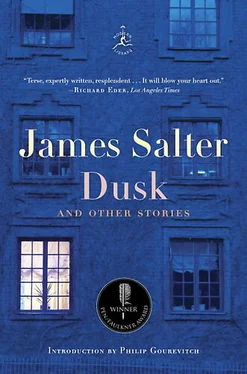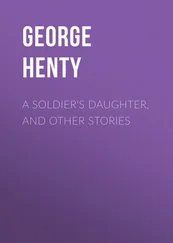“You know Marian and I are back together again. Did you know that?”
“Oh, I see.” She gave a slight, involuntary sigh. She felt strange. “I, uh…” What weakness, she thought later. “When did it happen?”
“A few weeks ago.”
After a bit she stood up. “Shall we go downstairs?”
She could see their reflections passing the stairway window. She could see her apricot-colored shirt go by. The wind was still blowing. A bare branch was scraping the side of the house. She often heard that at night.
“Do you have time for a drink?” she asked.
“I’d better not.”
She poured some Scotch and went into the kitchen to get some ice from the refrigerator and add a little water. “I suppose I won’t see you for a while.”
It hadn’t been that much. Some dinners at the Lanai, some improbable nights. It was just the feeling of being with someone you liked, someone easy and incongruous. “I…” She tried to find something to say.
“You wish it hadn’t happened.”
“Something like that.”
He nodded. He was standing there. His face had become a little pale, the pale of winter.
“And you?” she said.
“Oh, hell.” She had never heard him complain. Only about certain people. “I’m just a caretaker. She’s my wife. What are you going to do, come up to her sometime and tell her everything?”
“I wouldn’t do that.”
“I hope not,” he said.
When the door closed she did not turn. She heard the car start outside and saw the reflection of the headlights. She stood in front of the mirror and looked at her face coldly. Forty-six. It was there in her neck and beneath her eyes. She would never be any younger. She should have pleaded, she thought. She should have told him all she was feeling, all that suddenly choked her heart. The summer with its hope and long days was gone. She had the urge to follow him, to drive past his house. The lights would be on. She would see someone through the windows.
That night she heard the branches tapping against the house and the window frames rattle. She sat alone and thought of the geese, she could hear them out there. It had gotten cold. The wind was blowing their feathers. They lived a long time, ten or fifteen years, they said. The one they had seen on the lawn might still be alive, settled back into the fields with the others, in from the ocean where they went to be safe, the survivors of bloody ambushes. Somewhere in the wet grass, she imagined, lay one of them, dark sodden breast, graceful neck still extended, great wings striving to beat, bloody sounds coming from the holes in its beak. She went around and turned on lights. The rain was coming down, the sea was crashing, a comrade lay dead in the whirling darkness.
There is a kind of minor writer who is found in a room of the library signing his novel. His index finger is the color of tea, his smile filled with bad teeth. He knows literature, however. His sad bones are made of it. He knows what was written and where writers died. His opinions are cold but accurate. They are pure, at least there is that.
He’s unknown, though not without a few admirers. They are really like marriage, uninteresting, but what else is there? His life is his journals. In them somewhere is a line from the astrologer: your natural companions are women. Occasionally, perhaps. No more than that. His hair is thin. His clothes are a little out of style. He is aware, however, that there is a great, a final glory which falls on certain figures barely noticed in their time, touches them in obscurity and re-creates their lives. His heroes are Musil and, of course, Gerard Manley Hopkins. Bunin.
There are writers like P in an expensive suit and fine English shoes who come walking down the street in eye-splintering sunlight, the crowd seeming to part for them, to leave an opening like the eye of a storm.
“I hear you got a fortune for your book.”
“What? Don’t believe it,” they say, though everyone knows.
On close examination, the shoes are even handmade. Their owner has a rich head of hair. His face is powerful, his brow, his long nose. A suffering face, strong as a door. He recognizes his questioner as someone who has published several stories. He only has a moment to talk.
“Money doesn’t mean anything,” he says. “Look at me. I can’t even get a decent haircut.”
He’s serious. He doesn’t smile. When he came back from London and was asked to endorse a novel by a young acquaintance he said, let him do it the way I did, on his own. They all want something, he said.
And there are old writers who owe their eminence to the New Yorker and travel in wealthy circles like W, who was famous at twenty. Some critics now feel his work is shallow and too derivative—he had been a friend of the greatest writer of our time, a writer who inspired countless imitators, perhaps it would be better to say one of the great writers, not everyone is in agreement, and I don’t want to get into arguments. They broke up later anyway, W didn’t like to say why.
His first, much-published story—everyone knows it—brought him at least fifty women over the years, he used to say. His wife was aware of it. In the end he broke with her, too. He was not a man who kept his looks. Small veins began to appear in his cheeks. His eyes became red. He insulted people, even waiters in restaurants. Still, in his youth he was said to have been very generous, very brave. He was against injustice. He gave money to the Loyalists in Spain.
Morning. The dentists are laying out their picks. In the doorways, as the sun hits them, the bums begin to groan. Nile went on the bus to visit his mother, the words of Victor Hugo about all the armies in the world being unable to stop an idea whose time has come on an advertisement above his head. His hair was uncombed. His face had the arrogance, the bruised lips of someone determined to live without money. His mother met him at the door and took this pale face in her hands. She stepped back to see better. She was trembling slightly with a steady, rhythmic movement.
“Your teeth,” she said.
He covered them with his tongue. His aunt came from the kitchen to embrace him.
“Where have you been?” she cried. “Guess what we’re having for lunch.”
Like many fat women, she liked to laugh. She was twice a widow, but one drink was enough to make her dance. She went to set the table. Passing the window, she glanced out. There was a movie house across the street.
“Degenerates,” she said.
Nile sat between them, pulling his chair close to the table with little scrapes. They had not bothered to dress. The warmth of family lunches when the only interest is food. He was always hungry when he came. He ate a slice of bread heavy with butter as he talked. There was scrod and sautéed onions on a huge dish. Voices everywhere—the television was going, the radio in the kitchen. His mouth was full as he answered their questions.
“It’s a little flat,” his mother announced. “Did you cook it the same way?”
“Exactly the same,” his aunt said. She tasted it herself. “It may need salt.”
“You don’t put salt on seafood,” his mother said.
Nile kept eating. The fish fell apart beneath his fork, moist and white, he could taste the faint iodine of the sea. He knew the very market where it had been displayed on ice, the Jewish owner who did not shave. His aunt was watching him.
“Do you know something?” she said.
“What?”
She was not speaking to him. She had made a discovery.
“For a minute then, while he was eating, he looked just like his father.”
A sudden, sweet pause opened in the room, a depth that had not been there when they were talking only of immorality and the danger of the blacks. His mother looked at him reverently.
Читать дальше












